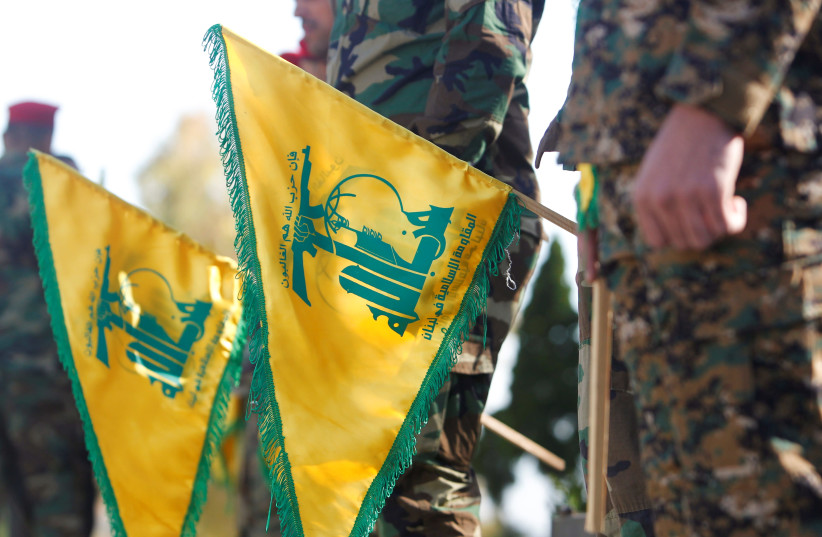UN Ambassador Gilad Erdan warned the United Nations that if UNIFIL did not take action to restrict Hezbollah, it would drag the entire region into a regional war.
TOVAH LAZAROFF
JULY 29, 2021 08:20

Hezbollah could spark a regional war unless the United Nations Security Council empowers its peacekeeper mission to fully monitor the terror group’s movements so its activity can be constrained, Israel Ambassador to the UN said on Wednesday.
“If not, Hezbollah may drag the entire region into a war that would only bring great destruction on Lebanon,” Erdan told the UNSC at its monthly meeting on the Middle East.
He urged the UNSC to increase the powers granted to the UN Interim Force in Lebanon tasked with monitoring violations to the ceasefire — codified under UNSC Resolution 1701 — which ended the 2006 second Lebanese war.
UNIFIL has operated along the Lebanese-Israeli border since 1978 and has a mandate that is renewed on annual basis. The UNSC is expected to vote on that mandate next month.
cnxps.cmd.push(function () { cnxps({ playerId: ’36af7c51-0caf-4741-9824-2c941fc6c17b’ }).render(‘4c4d856e0e6f4e3d808bbc1715e132f6’); });
“This Council must take the opportunity of the renewal of UNIFIL’s mandate next month to in Hezbollah’s terror activity in southern Lebanon by assuring that UNIFIL has the tools, authority and resolve to fulfill its mandate,” Erdan told the UNSC.
At issue, in particular, has been increased activity along the northern border by the Iranian proxy terror group Hezbollah, particularly its growing missile arsenal and its construction in the last years of border tunnels by which to attack Israel.
“When Resolution 1701 was passed, Hezbollah had about ten thousand rockets pointed at Israel. Today, it has 150,000 rockets hidden among the schools, mosques and homes of Lebanon,” Erdan said.
“Iran is working day and night to help Hezbollah obtain precision-guided missiles, and other advanced weapons,” he explained.
“Last week, two rockets were fired at Israel from within UNIFIL’s area of operations. This is completely unacceptable,” he added.
Erdan called on the UNSC to designate Hezbollah “in its entirety as a terrorist organization. Why allow Hezbollah to undermine Lebanese sovereignty, rather than acting forcefully to undermine Hezbollah’s terror activity?”
UNIFIL has 10,401 personnel from 46 countries operating in southern Lebanon, according to a report on Resolution 1701 which covered the periods February 20-June 18. It was authorized by UN Secretary-General Antonio Guterres and submitted earlier this month to the UNSC in advance of the mandate renewal.
Guterres wrote that it was important for UNIFIL to be granted greater access. UNIFIL’s “freedom of movement” in “its entire area of operations, including along the full length of the Blue Line remains critical,” Guterres explained. “The mission’s ability to conduct patrols and activities independently must be maintained in accordance with its mandate,” he added.
Guterres detailed six incidents in which UNIFIL patrols were blocked and in one instance accused of spying for Israel.
“I call upon the Lebanese authorities to grant UNIFIL full and timely access to all locations north of the Blue Line, requested in connection with the mission’s investigations, including with respect to tunnels crossing the Blue Line,” Guterres said.
He charged that the Lebanese authorities have the primary “responsibility for ensuring that there are no unauthorized armed personnel, assets or weapons in that area.”
Guterres also called for an end to violations of Resolution 1701 including the smuggling of arms to Hezbollah and the group’s firing of rockets toward Israel.
“The continued self-acknowledged maintenance of unauthorized weapons outside state control by Hezbollah and other non-state armed groups represents a persistent, grave violations of resolution 1701,” Guterres wrote.
“No progress” has been made with respect to the disarmament of these groups, Guterres explained adding that “allegations of arms transfer to non-state armed actors continued and remained of serious concern.”
Guterres also took Israel to task for its violations of Lebanese airspace. Israel uses Lebanese airspace for surveillance or to launch aerial attacks on Iranian-based targets.
“From February 20 to 18 June, UNIFIL recorded 260 airspace violations, totaling 412 hours and 43 minutes in overflight time. Drones accounted for approximately 80% of the violations,” Guterres said.
He also spoke overall of his concern for the political and economic crisis in Lebanon, where half the population could fall below the poverty line.
In New York on Wednesday Erdan said that Israel could offer assistance to Lebanon with its water technology, adding that it could do so with Iran as well. He painted a picture of how the region could look if ties existed between Israel and those two enemy states.
“Lebanon is in a state of crisis. According to UNICEF, Lebanon’s water system is on the verge of collapse,” he said.
“Parts of Iran are facing a water crisis so severe that protestors are out in the streets, and the Ayatollah regime is reacting like it always does, with violence and murder,” Erdan said.
“Israel is a world leader in water management and technology,” Erdan added.
“We would be glad to help the people of Lebanon and Iran improve their water security, just as we have helped many other nations in this field, and just like we agreed this month to provide Jordan with an additional 50 million cubic meters of water,” Erdan explained. He added that, “leading the way to a future of cooperation would hold great benefits for all.”
Unfortunately, he said, some countries like Iran which are bent on the pursuit of nuclear weapons and destabilizing the region are not interested in such cooperation.
“The IAEA reported this month that Iran is taking steps towards the production of uranium metal enriched to 20%,” Erdan explained.
“Iran has no credible civilian need for uranium metal R&D and production, which are a key step in the development of a nuclear weapon,” he added.
Content retrieved from: https://www.jpost.com/middle-east/constrain-hezbollah-before-it-drags-region-into-war-erdan-tells-unsc-675227.